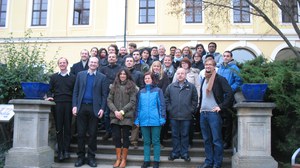Lectures
More information to the curriculum SS 2016 here.
General Information
The program offers research and training opportunities for graduate students with biological, medical or engineering background who wants to gain a PhD degree. Projects are based in medicine and natural sciences and include endothelial cell biology, cardiology, immunology, inflammation, physiology, pathology, biophysics, and biochemistry. Regular seminars are held every Thursday at 5 pm during the teaching semester in seminar room B.20.032 (Medical Theoretical Center). The seminars are in English and are open for all scientists interested in endothelial research.
Teaching Modules
The program offers a 3-year curriculum combined with an experimental project. The curriculum consists of weekly seminars given by the faculty professors and invited speakers. PhD students are required to report on the progress of their research projects (once per year) and participate in annual EH&D-student retreats. The progress reports are evaluated by the members of the Thesis Advisory Committee (TAC). Furthermore, PhD students are encouraged to take part in external research seminars organized by the Dresden biological community (MTZ, Biotec, CRTD, MPI-CBG). The required participation in lectures, seminars and colloquia are 250 hours.
For additional workshops and career development seminars, please refer to the qualification program of Dresden Graduate Academy:
http://tu-dresden.de/die_tu_dresden/zentrale_einrichtungen/graduiertenakademie/qualifizierungsprogramm/qualifizierungsprogramm
Journals Clubs
PhD students are encouraged to participate in journal clubs organized by their own research groups as well as in other journal clubs provided at the faculty:
http://www.uniklinikum-dresden.de/das-klinikum/kliniken-polikliniken-institute/kfo-252/activities/journal-clubs
Exam Systeme
An oral exam (rigorosum) and a public defense (disputation) should be passed for the doctoral degree.

